A place where geologist and fellow rock enthusiasts can tell their tales of woe
Don't wanna be here? Send us removal request.
Text


Buttes near Mawrth Vallis
These landforms show distinctive layering in Context Camera data, with a bright horizon on the cliff-edge. They are similar to other buttes to the west that have been observed to have Mawrth-like stratigraphy. Understanding the connection between these landforms is vital to our knowledge of their formation.
ID: ESP_076223_2090 date: 30 October 2022 altitude: 290 km
NASA/JPL-Caltech/University of Arizona
86 notes
·
View notes
Text
Archaeologists will call rocks anything except their actual geological name. *suffering psychic damage after yet another name for chlorite*
42 notes
·
View notes
Text
go outside.
look at the rocks.
know that they are older than you. they are older than anyone you know.
go back inside.
wait.
1K notes
·
View notes
Text




Flocking 9/13/24 -- Cameroceras, Thalassotitan, Ctenosauriscus, Saltopus. lucky friday the 13th (we got to draw a little fluffy guy)!
1K notes
·
View notes
Text
Monday Musings: Understanding Geologic Time

Deep time is not an easy thing to try and comprehend and it certainly doesn’t help when there’s all these crazy names being thrown at you. Let’s take a moment to break it down and really understand what we are seeing. The largest unit of geochronologic time is an eon. There are four formally defined eons: the Hadean, the Archean, the Proterozoic, and the Phanerozoic. The Hadean Eon is the oldest eon going from 4.6-4 Ga years ago. Its name is derived from the Greek god, Hades in reference to the still molten surface of the newly formed planet.
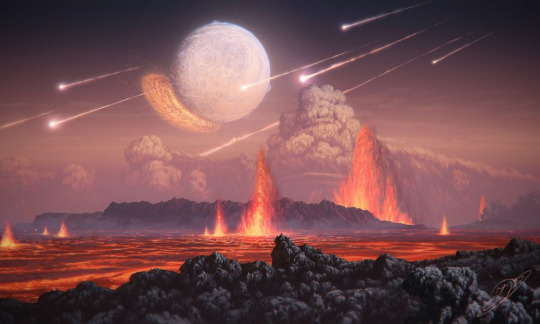
Following the Hadean Eon is the Archean Eon. This eon went from 4-2.5 Ga years ago. As mentioned in my Barberton Greenstone Belt video two weeks ago, this eon saw the creation of oceans and mountains as well as the appearance of the first living organisms known as stromatolites which would put oxygen into the atmosphere. Archean means “beginning or origin” which is fitting.
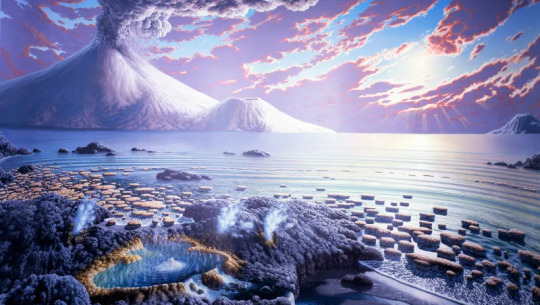
Next came the Proterozoic Eon. Lasted from 2.5 Ga-545 Ma. During this eon, the atmosphere became oxygenated, there were several glaciations, and the first eukaryotes evolved represented by the Ediacaran Biota. The name Proterozoic means “before life” because initially, fossils hadn’t been found until the Cambrian Period.

The last eon which we are currently in is the Phanerozoic Eon. It means “visible life” which makes sense as most living organisms have existed within this eon.

Okay, eons make sense? Excellent. Eons are broken down into eras. Now the Hadean is not broken into eras simply because the only evidence of this eon are detrital zircons in Australia.

The Phanerozoic Eon is the current eon and most of you are probably familiar with its eras: The Paleozoic Era, the Mesozoic Era, and the Cenozoic Era. These names mean “old life”, “middle life”, and “new life” respectively.
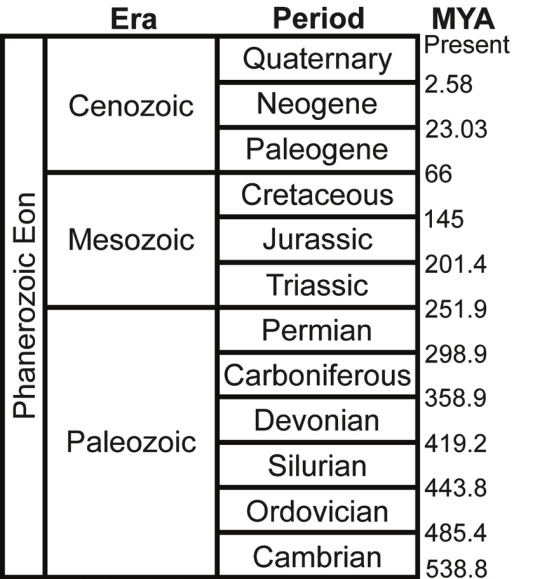
Eras are then split into periods. Like the Hadean before it, there isn’t enough evidence to split the Archean eras into periods. Again, we will use the Phanerozoic eras to show the break down starting with the Paleozoic.
The Paleozoic Era is split into six periods: the Cambrian Period,

the Ordovician Period,

the Silurian Period,
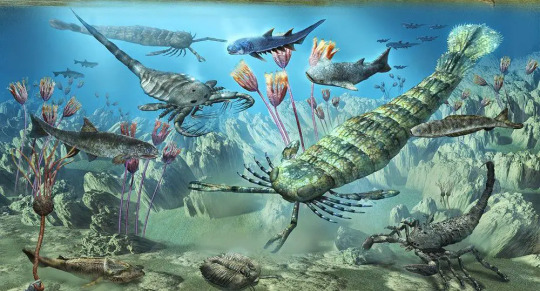
the Devonian Period,
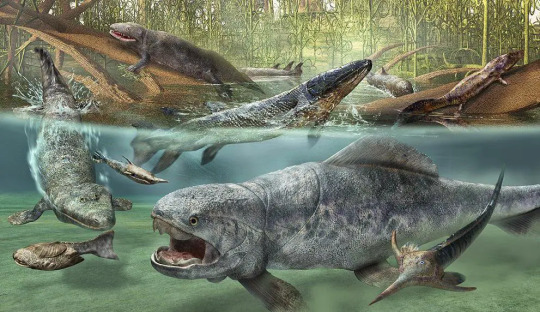
the Carboniferous Period

and the Permian Period.

These will be discussed in more detail later on down the road. I have already made posts on the Cambrian and the Ordovician Periods and this month is all about the Silurian Period.
The Mesozoic Era is split into three periods of which most people know the names: The Triassic,
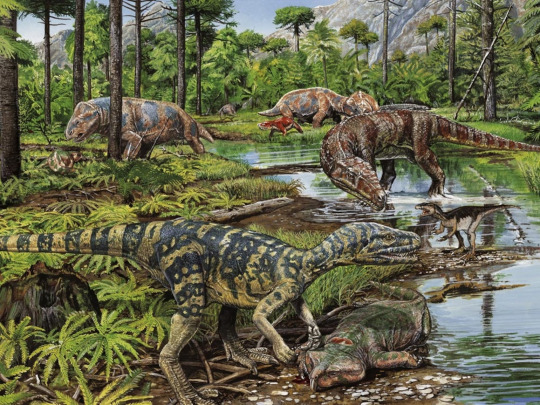
the Jurassic,

and the Cretaceous Periods.
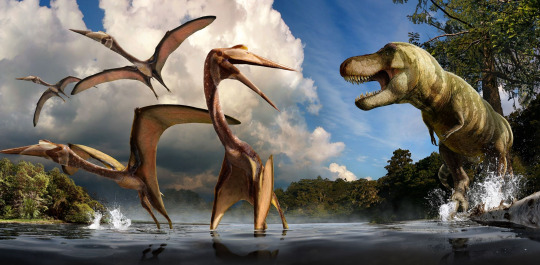
Each of these will be discussed in detail further down the road as well.
The Cenozoic Era is also split into three periods: The Paleogene Period,
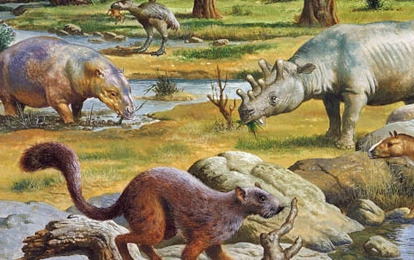
the Neogene Period,

and the Quaternary Period.

These will also be discussed in detail later.
Periods are further broken down into epochs. There are no formal epochs outside of the Phanerozoic Eon. Some early Paleozoic periods also do no have formal epochs. Many such as the Triassic and Jurassic Period are split into Early, Middle and Late. Strangely, the Cretaceous is only split into Early and Late though I think an argument could me made to create a middle.

The most well-known epochs are those of the Cenozoic Era. The Paleogene Period is split into three epochs: the Paleocene Epoch meaning “old dawn”,

the Eocene Epoch meaning “dawn”,

and the Oligocene Epoch meaning “few new”.
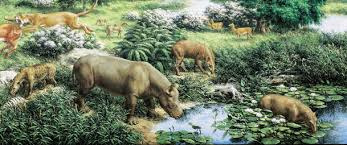
The Neogene Period is split into two epochs: the Miocene Epoch meaning “less new”
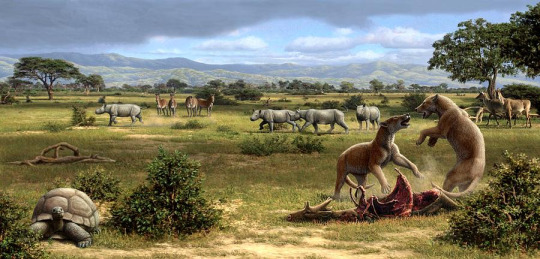
and the Pliocene Epoch meaning “more new/recent”.

The Quaternary Period is split into two epochs as well: the Pleistocene Epoch meaning “most new/recent”
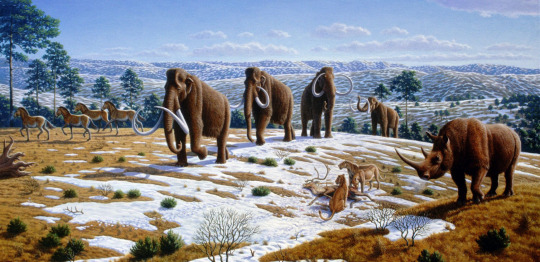
and the Holocene Epoch meaning “whole new” and is the epoch we are currently in.
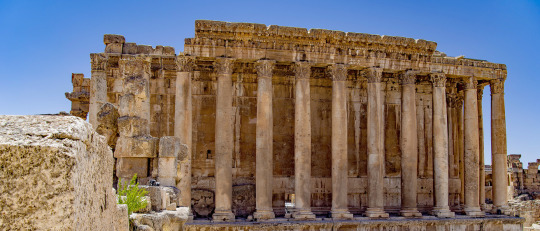
Epochs can then be broken down into still smaller categories called ages. For example, the Late Jurassic Epoch is broken up into three ages: Oxfordian Age, Kimmeridgian Age and Tithonian Age.
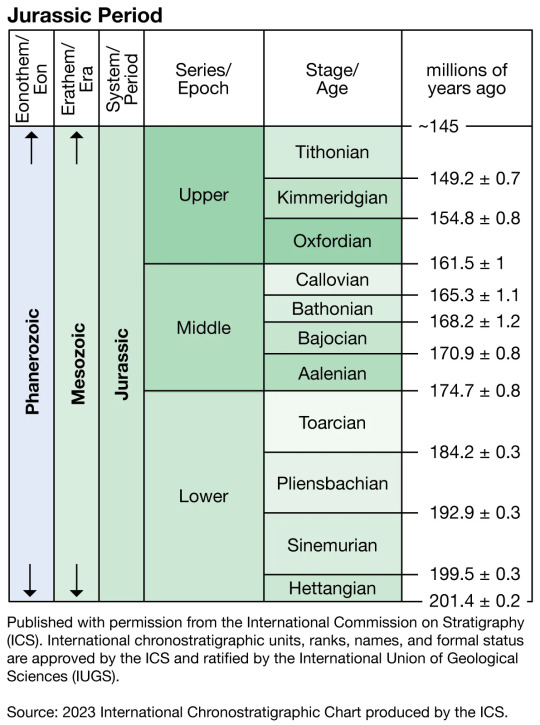
Now let’s put all these, eons, eras, periods, epochs, and ages into perspective. Let’s pretend Earth’s current lifespan is a clock. At 12:00, the Earth’s crust forms (Hadean Eon). At 2:10, the oldest rocks are preserved (Archean Eon). At 3:17, the first bacteria appear (Proterozoic Eon). At 11:52, the Cambrian Explosion occurs. At 11:53, first plants and fish. 11:54, first insects. 11:55, first reptiles and amphibians. 11:56, Mesozoic Era begins. 11:57, first dinosaurs, mammals, and birds. 11:59 Cenozoic Era.

Need a different visual? Try a calendar. The Hadean starts in January and ends halfway through February where the Archean picks up. The Archean lasts until halfway through June. From there, the Proterozoic starts and doesn’t end until about Thanksgiving. The Paleozoic Era then goes until about a week before Christmas. The Mesozoic covers Christmas to the December 30. New Year’s Eve represents the Cenozoic Era.
Thanks for coming to this lesson and make sure to tune in tomorrow for some fun trivia! Fossilize you later!

118 notes
·
View notes
Text




Ansichtskarte / Vintage Postcard
ROCK FORMATION NEAR SALISBURY
ATELIER SALISBURY
21 notes
·
View notes
Text
The time Louisiana lost a lake
The deepest lake in Louisiana, Lake Peigneur, 200 feet deep, was once only 10 feet deep. It was also freshwater instead of brackish (nearly saltwater). And in between, it disappeared into the ground entirely. There was an unnatural disaster that resulted in the lake completely collapsing and taking most of the surrounding area with it!

The secret of Lake Peigneur is that directly under it ran a massive salt mine, which had been used since the early 20th century. Unfortunately, an oil drilling company working on the surface of the shallow lake didn't bother finding that out, and it's believed that the exploratory holes punched into the roof of the salt mine in 1980.

The lake began to drain. In a rare event, the river that formerly flowed out of Peigneur to the Gulf of Mexico actually reversed, pulling in salty ocean water. It also formed Louisiana's largest waterfall for a few days, 164 feet high. In what must have been a beautiful and/or terrifying sight, air being forced out of the mine created 400-foot geysers of water in the area. A natural gas pipeline in the lake also ruptured and sent out a plume of fire.

The lake, now dry, had turned into a colossal sinkhole. No people were killed as Lake Peigneur disappeared, including workers in the salt mine below and what I have to assume was a very surprised fisherman on the lake. Eventually, the sinkhole consumed 65 acres of land. Most of the oil rig and barges were sucked into the pit, but several of them popped back to the surface after water had stopped flowing downward, which took several days.
25 notes
·
View notes
Text

Could our whole Universe be a black hole’s interior?
#AskEthan
Could the Big Bang that our Universe emerged from be related to a black hole's interior from a previous Universe?
The idea is wild, sure. But worth exploring? Definitely!
15 notes
·
View notes
Text


Bright Patches in Terra Sirenum
This observation is a good example of when different missions work together: the CaSSIS instrument on the ExoMars Trace Gas Orbiter identified here 10-meter scale bright patches on irregular collapse feature rims. An example of a location with possible mud volcanism? An image at HiRISE resolution can help to answer that question.
ID: ESP_076215_1380 date: 30 October 2022 altitude: 249 km
NASA/JPL-Caltech/University of Arizona
67 notes
·
View notes
Text

Lemur chicken Sinosauropteryx prima, the first non-avian dinosaur whose approximate colouration we figured. Scientists do that by examining levels of melanosomes, organelles in which melanin is synthesized, in the fossilized feathers. Different levels of melanin determine black and brown-orange colours.
What a cute couple! A lot of species have a wide range of colorations, so I thought it would be interesting if Sinosauropteryx had different patterns and hues too (inspired by The plausible colour morph in Sinosauropteryx chart by Mette Aumala). Also, I tried drawing with no lineart and I think it looks a lot better that way. And for the love of God, I cannot draw backgrounds.
Also here's an old drawing of Sinosauropteryx I made and didn't post..

Thanks to @queenofquestions for the suggestion!
1K notes
·
View notes
Text
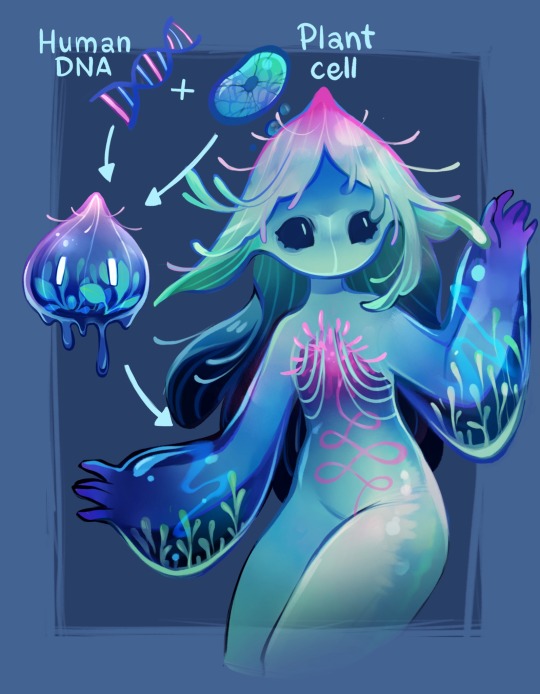
What if… human DNA fused with a plant cell?? And slowly evolved into a humanoid??
17K notes
·
View notes
Text
Cosmic Dawn through Her Lens: Sophia Roberts
If you’ve seen video footage of the James Webb Space Telescope, there’s a good chance you’ve seen it through her lens.
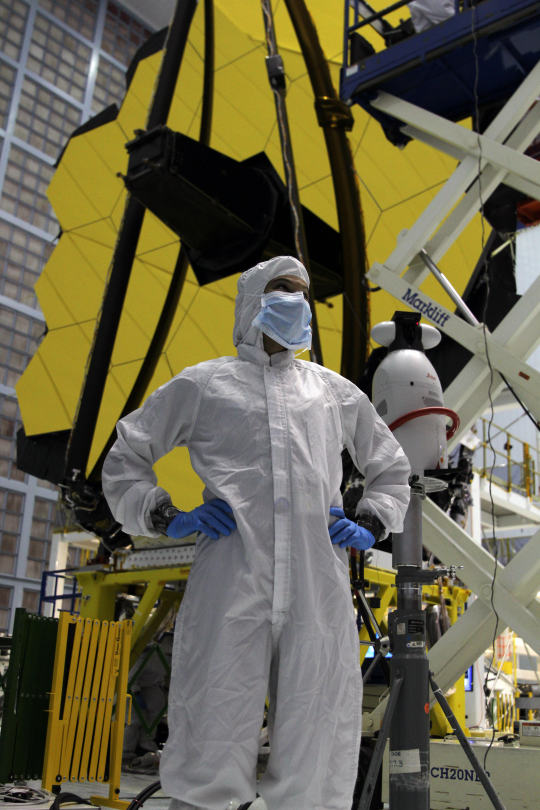
Sophia Roberts is an astrophysics video producer at NASA Goddard in Maryland. She spent years chasing Webb around the country as one of its primary videographers, documenting its construction and crafting stories that explained why Webb was worth building.
“There were countless potential points of failure. It was up to the communications team to acknowledge those risks honestly and help the public understand why the mission still mattered,” she said.

Sophia’s incredible efforts included capturing hours-long timelapses of major operations, filming inside clean rooms (special facilities where space mission components are assembled and tested), and editing these moments together, bringing the public on Webb’s journey with her. Sophia also tracked down the origins of many of the elements used to create Webb. She was even able to visit and film a beryllium mine, home to the rare metal from which Webb’s mirrors originated.
“Seeing this raw, elemental starting point for something as refined as a space telescope was unforgettable,” Sophia said.

What kept her going was her own curiosity, wondering: Why are the mirrors exposed? Why are they gold? What makes beryllium special? Why is the radiator black?
When Webb was transported via boat from the Port of Los Angeles to French Guiana (the telescope was too heavy to travel by bridge and too large for a plane), Sophia was there too! She rented a chase boat to follow Webb and film its journey.
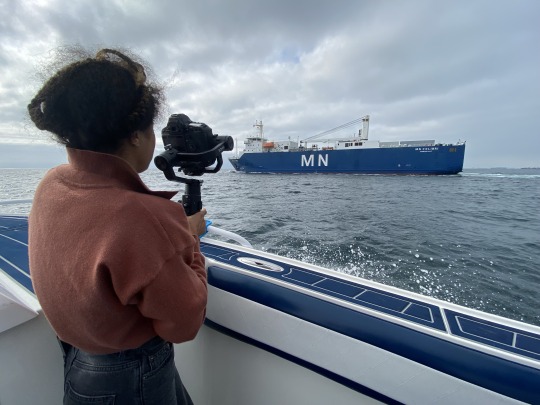
“Chasing Webb down the California coast at full speed felt like an action movie; and it was the last time we’d ever see it on U.S. soil,” she said.
Leading up to the telescope’s launch, the necessary work became more and more intense…and then launch! and it was done. It took a while to shake the “void” that the job had left behind.
Sophia and her team won several Webbys for their work, recognizing them for their social media campaigns, live broadcasts covering the launch, deployment, and first images, as well as a short film called 29 Days on the Edge, diving into the arduous process of unfolding Webb in space over a month after launch.

Sophia is one of the stars of our newest NASA+ documentary, Cosmic Dawn, which takes you behind the scenes of the world’s most powerful space telescope. See the story through her lens: https://www.nasa.gov/cosmicdawn/.
Make sure to follow us on Tumblr for your regular dose of space!
1K notes
·
View notes
Text
On This Day in Planetary Geology!
The first humans set foot on the Moon: July 20, 1969

Neil Armstrong's first photo after setting foot on the Moon, digitally scanned by JSC in 2004 from original film roll. Rocks returned by Apollo astronauts have revolutionized our understanding of planetary formation.
The first fully successful landing on Mars: July 20, 1976

This is the first photograph ever taken on the surface of Mars, by the Viking 1 Lander.
85 notes
·
View notes
Text

Can we fix the worst prediction in all of science?
#AskEthan
The cosmological constant is the worst prediction in all of science, off by ~122 orders of magnitude from the observed value.
Even worse: it's two unsolved problems in one.
24 notes
·
View notes
Text
the rock cycle is lowkey insane because what do you mean i can pick up a random rock from outside and its been in a heat comparable to the surface of the sun AND its also older rhan your entire bloodline
124 notes
·
View notes











